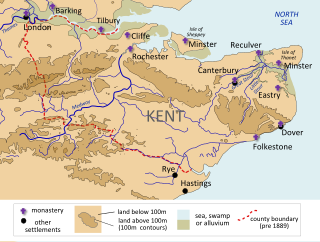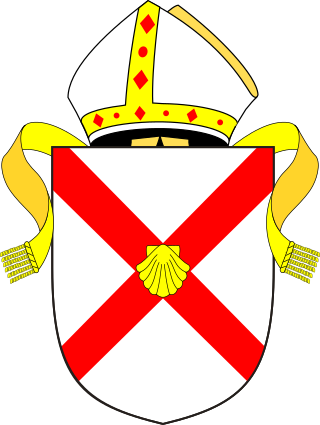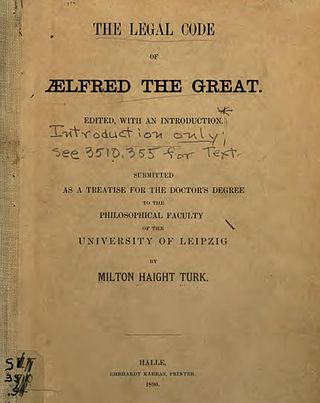
Justus was the fourth Archbishop of Canterbury. Pope Gregory the Great, sent Justus from Italy to England on a mission to Christianize the Anglo-Saxons from their native paganism, probably arriving with the second group of missionaries despatched in 601. Justus became the first Bishop of Rochester in 604 and attended a church council in Paris in 614.

Rochester is a town in the unitary authority of Medway, in Kent, England. It is at the lowest bridging point of the River Medway, about 30 miles (50 km) from London. The town forms a conurbation with neighbouring towns Chatham, Rainham, Strood and Gillingham. Rochester was a city until losing its status as one in 1998 following the forming of Medway and failing to protect its status as a city. There have been ongoing campaigns to reinstate the city status for Rochester.

Eadric was a King of Kent (685–686). He was the son of Ecgberht I.
Tytila was a semi-historical pagan king of East Anglia, a small Anglo-Saxon kingdom which today includes the English counties of Norfolk and Suffolk. Early sources, including Bede's Ecclesiastical History of the English People, identify him as an early member of the Wuffingas dynasty who succeeded his father Wuffa. A later chronicle dates his reign from 578, but he is not known to have definitely ruled as king and nothing of his life is known. He is listed in a number of genealogical lists.

Ernulf was a French Benedictine monk who became prior of Christ Church in Canterbury, abbot of Peterborough, and bishop of Rochester in England. A jurist and an architect as well, he was responsible for greatly expanding Canterbury Cathedral during his time there.

The Textus Roffensis, fully titled the Textus de Ecclesia Roffensi per Ernulphum episcopum and sometimes also known as the Annals of Rochester, is a mediaeval manuscript that consists of two separate works written between 1122 and 1124. It is catalogued as "Rochester Cathedral Library, MS A.3.5" and as of 2023 is currently on display in a new exhibition at Rochester Cathedral, Rochester, Kent. It is thought that the main text of both manuscripts was written by a single scribe, although the English glosses to the two Latin entries were made by a second hand. The annotations might indicate that the manuscript was consulted in some post-Conquest trials. However, the glosses are very sparse and just clarify a few uncertain terms. For example, the entry on f. 67r merely explains that the triplex iudiciu(m) is called in English, ofraceth ordel.

The Diocese of Rochester is a Church of England diocese in the English county of Kent and the Province of Canterbury. The cathedral church of the diocese is Rochester Cathedral in the former city of Rochester. The bishop's Latin episcopal signature is: " (firstname) Roffen", Roffensis being the genitive case of the Latin name of the see.

Sigered of Essex was the last king of Essex from 798 to 825. The son of Sigeric of Essex, Sigered became king when his father abdicated the throne.

The Doom Book, Dōmbōc, Code of Alfred or Legal Code of Ælfred the Great was the code of laws compiled by Alfred the Great. Alfred codified three prior Saxon codes – those of Æthelberht of Kent, Ine of Wessex and Offa of Mercia – to which he prefixed the Ten Commandments of Moses and incorporated rules of life from the Mosaic Code and the Christian code of ethics.
The Annals of Tigernach are chronicles probably originating in Clonmacnoise, Ireland. The language is a mixture of Latin and Old and Middle Irish.

A cartulary or chartulary, also called pancarta or codex diplomaticus, is a medieval manuscript volume or roll (rotulus) containing transcriptions of original documents relating to the foundation, privileges, and legal rights of ecclesiastical establishments, municipal corporations, industrial associations, institutions of learning, or families. The term is sometimes also applied to collections of original documents bound in one volume or attached to one another so as to form a roll, as well as to custodians of such collections.

The Bishop of Rochester is the ordinary of the Church of England's Diocese of Rochester in the Province of Canterbury.
Wehha of East Anglia is listed by Anglo-Saxon records as a king of the East Angles. If he existed, Wehha ruled the East Angles as a pagan king during the 6th century, at the time the region was being established as a kingdom by migrants arriving from what is now Frisia and the southern Jutland peninsula. Early sources identify him as a member of the Wuffingas dynasty, which was established around the east coast of Suffolk. Nothing of his reign is known.

Gundulf was a Norman monk who went to England following the Norman Conquest. He was appointed Bishop of Rochester and Prior of the Cathedral Priory there. He built several castles, including Rochester, Colchester and the White Tower of the Tower of London, and the Priory and Cathedral Church of Rochester.
John Young was an English academic and bishop.
Geþyncðo, meaning “Dignities”, is the title given to an Old English legal tract on status and social mobility, probably written by Wulfstan (II), Archbishop of York between 1002 and 1023. It is sometimes known as one of the so-called 'promotion laws', along with Norðlleoda laga, and both these texts belong to a legal compilation on status, dubbed ‘the Geþyncðu group’ by the historian Patrick Wormald. Though the extent to which these reflect reality is a topic of some debate, they constitute one of the most valuable primary documents for an understanding of social status in late Anglo-Saxon England.

The Law of Æthelberht is a set of legal provisions written in Old English, probably dating to the early 7th century. It originates in the kingdom of Kent, and is the first Germanic-language law code. It is also thought to be the earliest example of a document written in English, or indeed in any form of a surviving Germanic language, though extant only in an early 12th-century manuscript, Textus Roffensis.

Rochester is a town and former city in Kent, England. It is located at the lowest bridging point of the River Medway about 30 miles (48 km) from London. The town's location is due to the bridge which carries the Roman Watling Street over the river.
John Denne D.D. (1693–1767) was an English churchman and antiquarian, Archdeacon of Rochester from 1728.
Norðleoda laga is a set of laws apparently pertaining to the Anglo-Saxon kingdom of Northumbria. Mention of a Northumbrian king suggests that the text originates before the mid-tenth century, when Northumbria ceased to be an independent kingdom. The text comprises a list of the wergelds payable on the killing of people of different social statuses, with the following values:










